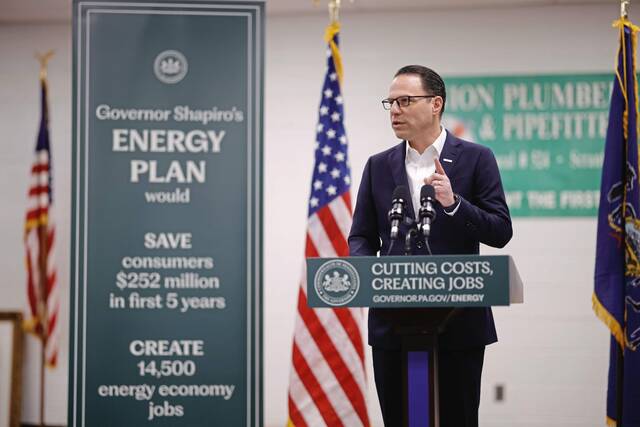Though elected in 2022, Gov. Josh Shapiro remains stuck in campaign mode, offering one empty platitude after another while avoiding the hard work Pennsylvanians elected him to do.
Despite his incessant mantra of “getting stuff done,” Shapiro has done the opposite. His first year ranks him as the least productive governor in recent Pennsylvania history, with few accomplishments during his tenure.
Case in point: the 2023-24 budget debacle. Shapiro undid months of good-faith negotiations by jettisoning one of his top campaign promises: Lifeline Scholarships, which he renamed the Pennsylvania Award for Student Success (PASS). Shapiro did nothing to bring lawmakers to the negotiating table.
Instead, he repeatedly passed the buck, blaming this “unfinished business” and the six-month impasse on America’s “only divided state Legislature.”
Two months after his first budget finally limped past the finish line, Shapiro unveiled his 2024-25 budget proposal. But the governor’s $48 billion proposal — a 7.1% increase from last year — is as fiscally irresponsible as it’s politically untenable.
Shapiro’s budget plays fast and loose with numbers, exacerbating Pennsylvania’s underlying structural deficit. He proposed spending $3 billion more than revenues this coming year, ballooning the annual deficit to $6 billion.
To hide the severity of the state’s fiscal cliff, the governor overestimates revenue (as forecasted by the Independent Fiscal Office) and underestimates spending (by projecting no increases for basic education in future years). Shapiro’s proposal would drain the commonwealth’s General Fund balance by 2026-27, forcing lawmakers to raise taxes, cut spending or both.
Shapiro’s recommendation for balancing the books is even more unsettling: raid Pennsylvania’s Rainy Day Fund. State law, however, mandates that this fund “shall not be used to begin new programs but to provide for the continuation of vital public programs in danger of being eliminated or severely reduced due to financial problems resulting from the economy.”
When asked to address his fiscally dangerous plans, Shapiro routinely says, “We can’t afford not to invest right now.” This nonsensical platitude is not only a terrible campaign slogan but also a disastrous way to budget and govern.
Built into his unfeasible budget is Shapiro’s vague vision for higher education. Promising to overhaul Pennsylvania’s university system and cap tuition, the governor’s unserious proposal can’t withstand the slightest scrutiny.
During recent budget hearings, Daniel Greenstein, chancellor of the Pennsylvania State System of Higher Education, struggled to offer any specific details to questions about the governor’s plan. “I don’t know” was Greenstein’s go-to answer.
State Sen. Judy Schwank, a Democrat, excused Greenstein’s lack of knowledge and then threw her party leader under the bus. “There should be somebody else sitting at that table answering those questions,” said Schwank.
Yet, instead of straight answers, Shapiro tours the state for campaign-style photo ops, full of rhetoric and his favorite clichés.
Shapiro’s overzealous energy ambitions also won’t pass muster.
A Commonwealth Court ruled against Pennsylvania’s membership in the Regional Greenhouse Gas Initiative (RGGI), striking down the attempt to impose an energy tax without legislation. Shapiro himself questioned RGGI from the start, calling RGGI “not real action.” However, rather than accept this ruling, Shapiro appealed the decision at taxpayer expense.
The governor seems less interested in the environment and more in maintaining his executive authority to unilaterally levy taxes without legislative input.
With RGGI in limbo, Shapiro offered two new, equally disastrous energy-related acronyms: the Pennsylvania Climate Emissions Reduction Act (PACER), a copy-and-paste of RGGI’s tax on energy production, and the Pennsylvania Reliable Energy Sustainability Standard (PRESS), new mandates for politically selected, unreliable energy sources.
Shapiro knows these proposals lack support in the state Senate and is virtue signaling to the more radical elements of his party. Again, he falls back on campaign bluster, chastising critics, saying, “Doing nothing isn’t an option.”
Unfortunately, his plan is worse than doing nothing. It will drive up electricity prices, drive energy production and jobs out of Pennsylvania, and undermine the reliability of our electric grid — threatening blackouts.
Voters notice Shapiro’s lack of leadership. Moreover, when asked, few can name a single accomplishment, much less a legislative achievement.
If Shapiro truly wants to “get stuff done,” he needs to shift away from the endless campaign sloganeering and get serious about governing.
Nathan Benefield is the senior vice president of the Commonwealth Foundation.








